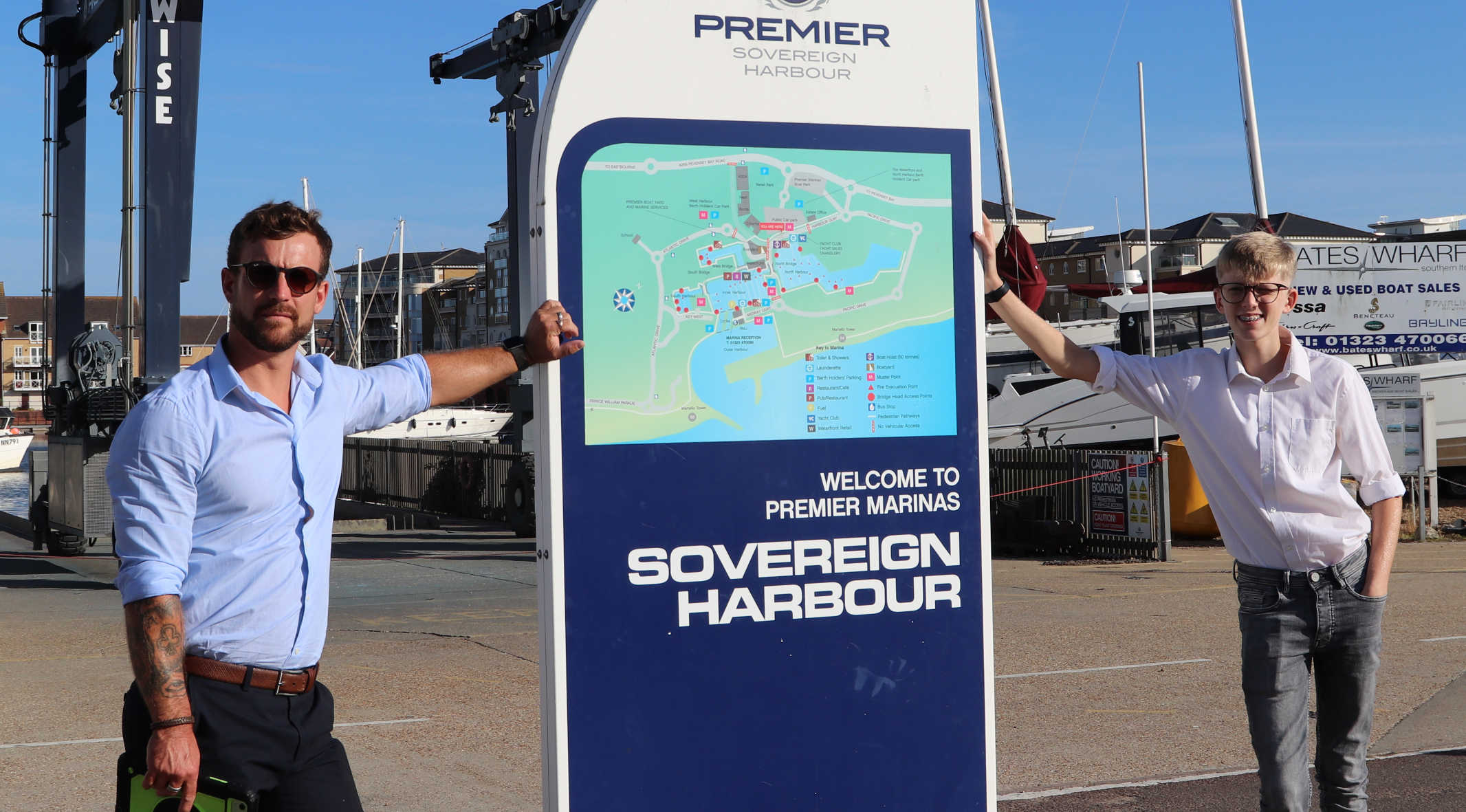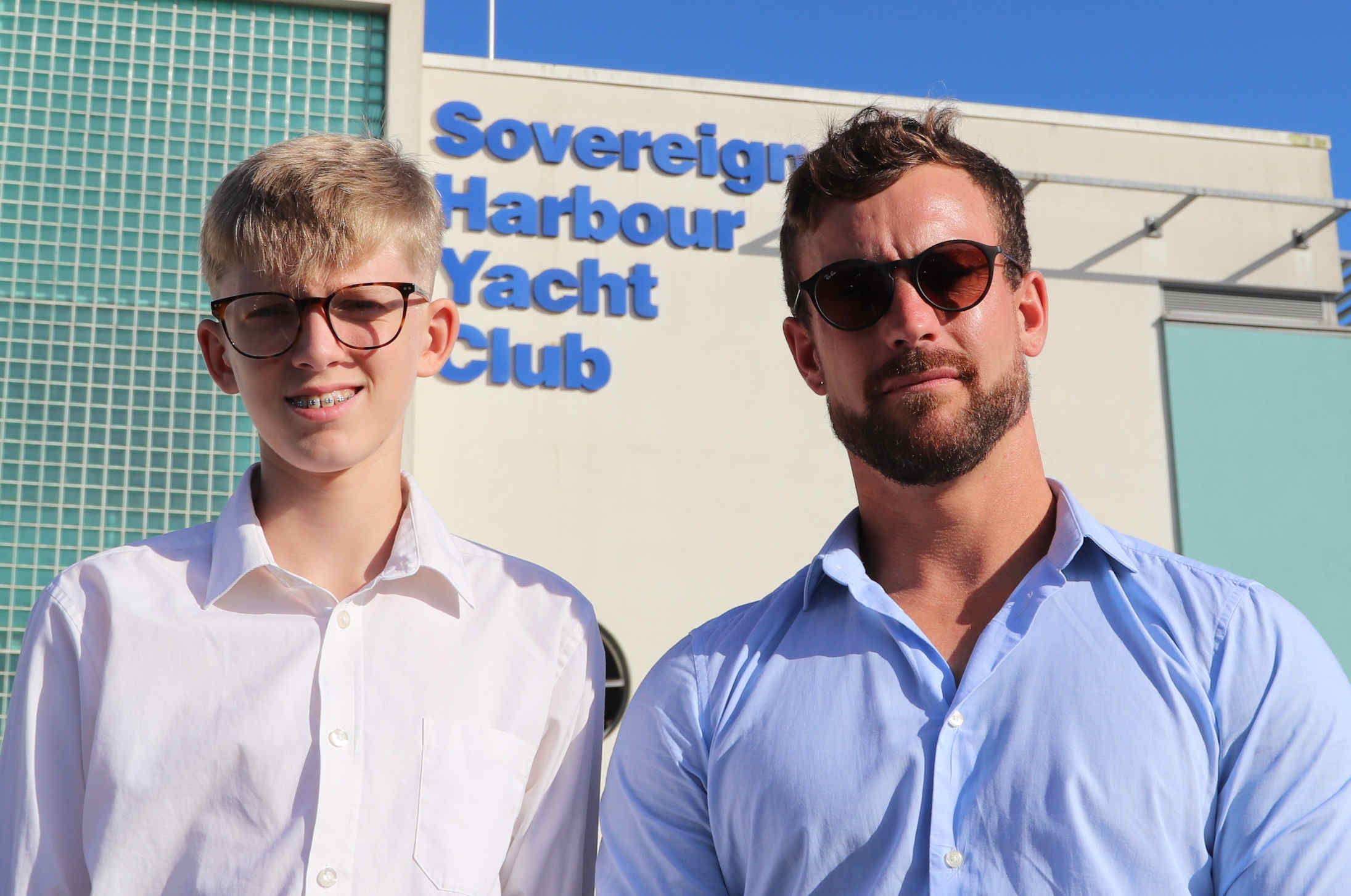
TEAM
ELIZABETH SWANN - Terry and Ryan are team members of the Elizabeth Swann,
JVH2, hydrogen powered ocean racing trimaran.
Designed to challenge the diesel record, to achieve a circumnavigation
in under 80
days - as per the famous Jules Verne novel. Terry says: The fitness fundamentals for sailors are aerobic endurance and muscle strength. Sailing relies a lot on upper body and core strength for most of the repetitive moves on deck. It also demands good lower-back strength to help support your core and avoid injury.
These may not be seen as priorities for crewing a hydrogen powered
electric yacht, nevertheless, crew fitness is considered to be essential
for mental alertness, and coping with life onboard.
PREPARING
FOR EXTENDED CRUISING
Most boating enthusiasts donít need an intensive exercise regime to keep sailing, which is a
sport that tends to keep you fit and active
stand-alone. That said, strength and endurance can be really beneficial when youíre spending long days on the water - and give you the endurance edge over other teams in, for example, competition racing, when you will need a far higher level of power and endurance.
The type of sailing you do will impact the type of training you need. It is specific to your boat and your expectations. Leisure sailors may not need to be ocean athletes. But it pays to keep your body in good condition, to be able to meet the challenges the sea can throw at
you, and keep your mind alert to changing conditions, when the
opportunity to build up stamina onboard a vessel is limited.
The
ultimate challenge for the human frame is ocean racing, and the pinnacle
of ocean racing endeavour, is a circumnavigation. A feat of navigation
renowned for
exhausting even the top sailors. And then there is the matter or
survival, should the worst happen.
Diet is important, to help you stay in shape while at sea, and to build up your stamina before embarking on your
waterborne adventures.
Exercise and diet is thus interlinked, especially for those who are climate
conscious, perhaps contemplating a pescatarian,
vegetarian, or most demanding of all, a
vegan diet while afloat.
If you need high arm speed when youíre on your boat for winching, you should try to mirror
that movement speed in your training. There is no one-size-fits all approach to fitness.
A small boat will demand more agility and alertness, a larger boat with
bigger sails to manhandle, will require physical strength and stamina.
All
of that goes by the board, if you have automatic rigging, or a motor
boat. But, being fitter will help you make better decisions, and cope
with stress as a skipper.
When you canít get out on your boat, try to work on your fitness at home instead. It is hard to stay in shape during the off-season with high calorie meals during celebrations, that pile on the pounds. Making it all the more difficult to stay fighting fit when itís time to get back on the
water. Water being
a valuable resource, that is in short supply, in many countries,
including in England, where housing over-development is drying up reservoirs,
and disposal of untreated sewage out to sea by irresponsible water
companies (attracting fines) is now a regular occurrence. And then there
is plastic
pollution in our oceans, slowly contaminating fish
stocks with carcinogens.
Glass Reinforced Plastic (GRP),
or which many boats are made of, is also a major concern. Where seafood
is being contaminated with glass strands, as old boats are left to rot
in rivers, rather than be thoughtfully recycled. Thankfully, the
majority of boat owners, retire their boats considerately. For which
they have the unspoken thanks of marine fauna.
1
- Overload: Gradually work the muscles harder to get stronger. Gradually add to your training Ė weight, number of repetitions, variety and/or number of sets. By gradually, we mean no more than 10% addition to your last session in terms of weights/reps Ė anymore and thereís greater risk of injury.
2 - Overhaul: Every four weeks or so you should revamp your program to give the muscles completely new exercises and loads. Muscles like to be challenged and stimulated in different ways.
3 - Specificity: Your strength gains are specific to the movements and speed of movement you do in training. If you need high arm speed and moderate strength to pull up a kite, then your gym training should reflect this movement speed and muscle groups used.
4 - Progression & Specifics: Sequence training so that you start with a period of building muscles, then move towards very sport-specific exercises, loads and movement speeds.
As an example, if you have, say, six months to develop your strength, begin with a build-up month of three sets of 12-15 reps, followed by two months of gradually heavier weights and fewer reps to get you really strong (three to four sets of 6-8 reps). Then turn towards endurance with a month of three sets of 15-25 followed with a month of circuit-style exercises (40s on, 20s off). Finish with a month of pure strength/endurance work Ė higher reps of very sailing-specific exercises.
5 - Recovery: Allow 48 hours between strength sessions. So, for general purpose strength gains, you
would train three times a week.
6 - Posture & Balance: Include exercises that improve posture, balance, joint stability, abdominals and back muscles. These Ďab and backí exercises are nice to do at the start of a session, rather than the end, so they donít get left out and they will prime those muscles to work during the session.
7 - Adaptation: Be prepared to modify and fine tune your training each day to allow for not feeling 100%, persistent windy weather (meaning harder on-water training) and a desire to add variety.

YOUTH
OCEAN AMBASSADOR - Ryan is the youngest member of the Elizabeth Swann
team. He is coached in fitness matters by Terry, a seasoned vegan, having
weaned himself off meats over a year ago. Ryan has been attending
exhibitions and events for many
years. Often helping to man the stands at events where (for example) the
SeaVax
proof of concept vessel was on
display.
OCEAN ADVENTURERS
The best defense is a strong offense. The stronger you become both mentally and physically, the better you will become at coping with the stresses associated with competition sailing, if that is your aim. You need to be sharp, prepared and capable in order to win competitions.
If you want to improve your general sailing fitness, you don't need to be quite so disciplined and focused. But, it pays to make the effort when you can.
If it was easy, then everyone would be doing it. So think about your health, diet and exercise, for which you will see
results, and being healthier, is one way of remaining youthful and
living longer.
